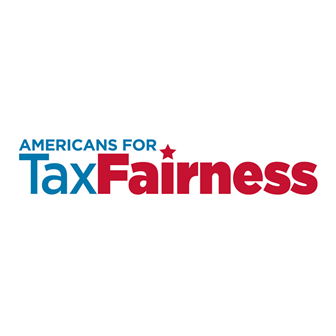- Like
- Digg
- Del
- Tumblr
- VKontakte
- Buffer
- Love This
- Odnoklassniki
- Meneame
- Blogger
- Amazon
- Yahoo Mail
- Gmail
- AOL
- Newsvine
- HackerNews
- Evernote
- MySpace
- Mail.ru
- Viadeo
- Line
- Comments
- Yummly
- SMS
- Viber
- Telegram
- Subscribe
- Skype
- Facebook Messenger
- Kakao
- LiveJournal
- Yammer
- Edgar
- Fintel
- Mix
- Instapaper
- Copy Link

FOR IMMEDIATE RELEASE: December 20, 2022
This release is available in html and PDF here.
IN BLOCKING RENEWAL OF THREE CORPORATE TAX BREAKS, CONGRESS IS POISED TO WIN ONE FOR TAX FAIRNESS
On the Other Hand, Congress Is About to Give More Tax Breaks to the Wealthy Saving for Retirement While Giving Crumbs to Working People
Washington, D.C. – In a victory for tax fairness, Congress has rejected in the newly released omnibus spending package the renewal of three major tax breaks urgently sought by big corporations, which were part of the 2017 Trump-GOP tax law. Together they could have cost $600 billion in lost revenue over 10 years. Americans for Tax Fairness and its progressive allies—whose opposition contributed to this unusual setback for corporate interests—applauded this win for working families and declared it a harbinger of more such wins in the future.
At the same time, changes in the tax treatment of retirement savings were included in the omnibus budget bill that were opposed in a letter from 45 by progressive groups because they “purport to help low- and middle-income families prepare for retirement … but will primarily subsidize the wealthy and worsen the racial wealth gap.”
Corporate lobbyists are sure to renew next year their efforts to resurrect the trio of tax breaks, two of which expired in January; the third will expire next month. This battle previews the coming Republican push to extend other tax breaks from their 2017 tax law that are scheduled to expire in coming years.
Many congressional Democrats and outside groups had demanded that any corporate tax breaks in a year-end budget deal be paired with a strengthened Child Tax Credit (CTC). Reforms to the CTC in 2021 pulled millions of kids out of poverty before abruptly ending this year. ATF strongly endorsed an improved CTC but argued the price should not be more tax giveaways to corporations. It spearheaded a letter to Congress from 60 national organizations opposing renewing the expired tax breaks and calling on Congress to instead raise taxes on corporations by building on the tax reforms enacted in the Democrats’ Inflation Reduction Act and proposed in President Biden’s original Build Back Better plan.
Republicans decided the reverse: cutting taxes on their corporate backers was not worth it if they also had to pay to increase the economic security of low-income children.
“Until this year, passing bipartisan year-end corporate tax breaks has been as common as holiday gift-giving,” said Frank Clemente, ATF’s executive director. “But public demand for tax fairness has grown so strong that such bills can no longer fly through Congress without serious opposition or even inquiry. In the end, Republicans chose corporations over kids at Christmas.
“We still have plenty of work to do,” Clemente continued. “That’s clear from the bipartisan support for tax legislation that gives even bigger tax breaks to the wealthy saving for retirement over working people. Rather than passing legislation that does more to ensure a dignified old age for workers, Congress once again is fattening the retirement accounts of the rich and making the racial wealth gap even worse.”
The three tax corporate tax breaks Congress has for now rejected are:
- Reversing the change in the Research & Experimentation tax deduction so that corporations can continue to write off 100% of research expenses all at once instead of more realistically over five years. Cost: $60 billion (1st year); $155 billion (10 years).
- Reversing the change in the Net Interest Deduction tax break so that corporations can continue to deduct more of the cost of borrowing money by changing how the deduction is calculated. Cost: $20 billion (1st year); $200 billion (10 years).
- Extending 100% Bonus Depreciation beyond 2023 so corporations can continue to write off immediately the full cost of assets that hold their value a long time. Cost: $15 billion (1st year); $250 billion (10 years).
Some of the biggest corporations lobbying for extending these tax breaks are also among the nation’s most prominent tax dodgers. For example, five members of the leadership committee of the R&D Coalition—Amazon, Ford, Intel, Microsoft, and Northrop Grumman—which is leading the charge for one of the tax breaks, have in recent years paid tax rates below the average 13% rate paid by families, according to an analysis by the Institute on Taxation and Economic Policy (ITEP) and Americans for Tax Fairness (ATF).
The retirement-system bill Congress is set to approve offers some boosts to low-wage retirement security, but those reforms are far outweighed by costly changes in how much high-income employees can contribute to tax-advantaged retirement accounts and how long they can keep the money there, compounding tax-free. The legislation does nothing to curb existing abuses like “mega Roth IRAs”—the hijacking by the super-rich of an account meant for low- and middle-income savers—or strengthen bedrock retirement systems like Social Security or Supplemental Security Income.
###
—
Frank Clemente
Executive Director
Americans for Tax Fairness
Americans for Tax Fairness Action Fund
m 202-441-9818
Follow ATF Website | Facebook | Twitter | Instagram | TikTok



